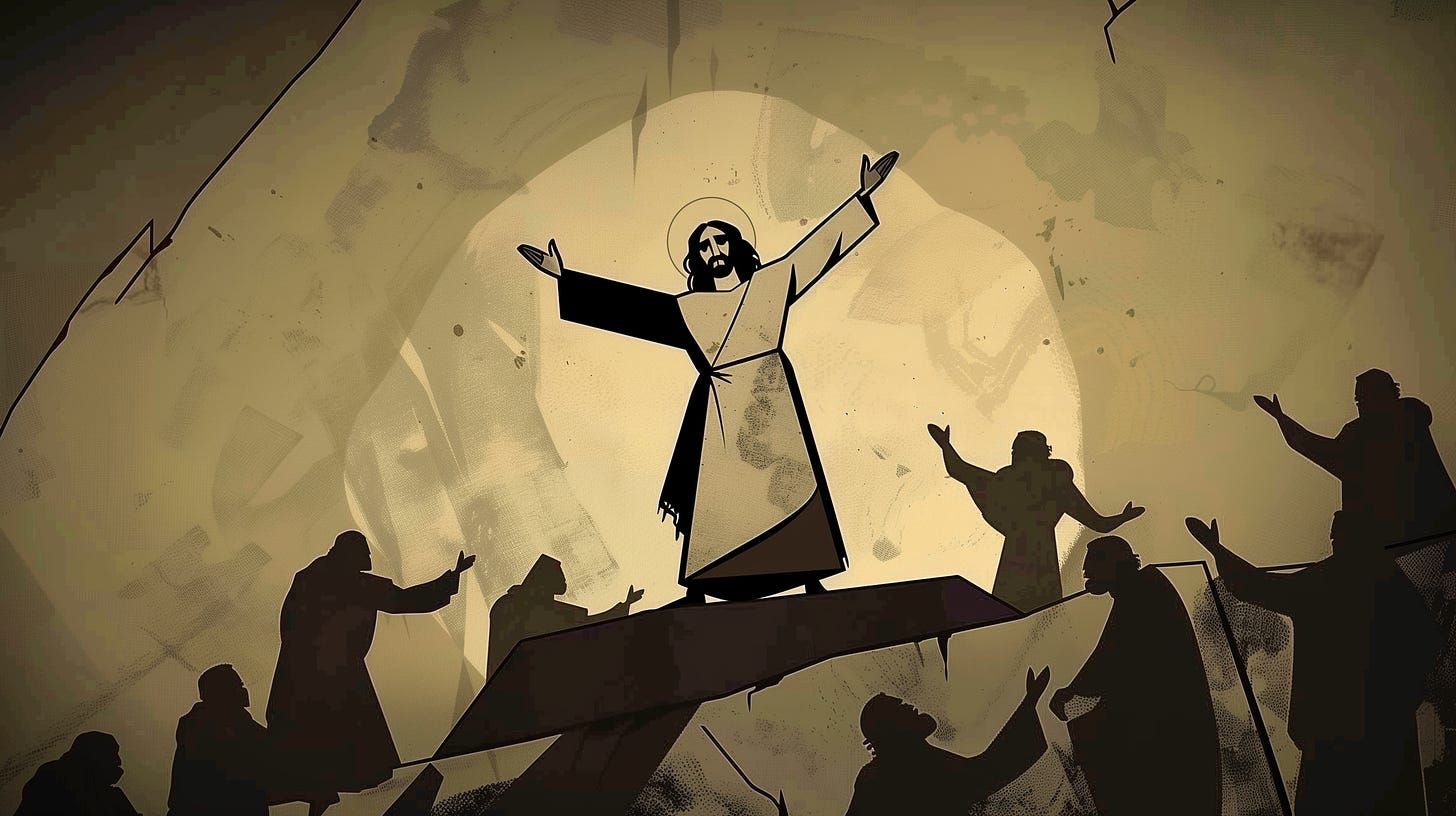In the epoch of Christian faith, the themes of life, death, and resurrection resonate with profound depth and significance. These themes are not only foundational to Christian doctrine but also deeply personal, touching the very core of human existence. At the heart of this narrative lies a paradox: while physically alive, many find themselves spiritually dead, entombed in a metaphorical grave crafted by sin. This essay embarks on a journey to unravel the biblical concept of the grave, exploring its dual nature as both a physical resting place and a symbol of spiritual death. We will delve into the transformative power of Jesus Christ's resurrection, examining how this pivotal event offers believers a path from spiritual death to a vibrant, resurrected life. Along the way, we will confront the stark reality that even as Christians, we can fall prey to living as though we are still dead in our sins. Through a detailed examination of Scripture and theological insights, this essay seeks to illuminate the path from the darkness of the grave to the glorious light of resurrection life.
The Biblical Concept of the Grave
In scripture, the grave serves as a powerful symbol with multiple dimensions. On one hand, it represents the physical place where bodies are interred after death. On the other hand, it serves as a metaphor for spiritual death—a state of being that estranges individuals from God due to sin. Ephesians 2:1-10 vividly describes this condition: "At one time you were dead because of your sins. You followed the sinful ways of the world and obeyed the leader of the power of darkness. He is the devil who is now working in the people who do not obey God." This passage underscores the idea that sin leads to a state of spiritual death, marked by obedience to worldly desires and estrangement from God's life-giving presence.
Spiritual Death and Physical Death
The grave from which we are physically rescued according to Scripture is the same grave we will eventually inhabit when we die a physical death. However, the Bible makes it clear that we are "dead in our sins" long before our physical demise. This spiritual death, characterized by separation from God and subjugation to sinful impulses, is a condition that affects every person from birth. The spiritual death described in Ephesians 2:1-10 emphasizes that apart from Christ, all humanity is spiritually dead, following the ways of the world and the ruler of the kingdom of the air.
This duality of death—both physical and spiritual—is a crucial concept in Christian theology. Physical death is an inevitable part of the human condition, but spiritual death is a state from which believers are rescued through faith in Jesus Christ. This rescue is not just a future promise but a present reality that transforms the believer's life.
The metaphor of being dead and in a grave takes on significant spiritual meaning. It suggests that one can be physically alive yet spiritually dead, acting in ways that are contrary to the teachings of Christ. This spiritual death is marked by behaviors and attitudes that reflect a life separated from God. For Christians, this metaphor serves as a poignant reminder of the potential to live as though spiritually dead, even after having received the gift of salvation.
True Belief and Its Implications
An argument can be made that someone who continues to act as if they are dead in their sins does not truly believe that Christ rose from the grave. The resurrection of Jesus is the cornerstone of Christian faith and the source of the believer's power to overcome sin and death. Ephesians 2:4-10 affirms this truth: "But God had so much loving-kindness. He loved us with such a great love. Even when we were dead because of our sins, He made us alive by what Christ did for us. You have been saved from the punishment of sin by His loving-favor."
True belief in the resurrection of Jesus is transformative. It empowers believers to live lives that reflect the reality of this victory over death and sin. However, when Christians fail to fully grasp or live out this truth, they can find themselves metaphorically buried in a grave of sin. This disconnect between belief and behavior is a significant issue for Christian discipleship.
Jesus' victory over death and the grave provides believers with the assurance of life everlasting. This victory is not just a future hope but a present reality that transforms the believer's life. Through the resurrection, believers are given the power to overcome sin and live in the freedom that Christ provides. This transformation is both instantaneous and ongoing, requiring believers to continually renew their minds and live out the reality of their new life in Christ.
Overcoming Spiritual Death
Overcoming the patterns of behavior associated with spiritual death is simple in concept but challenging in practice. The good news is that Jesus has already won the victory over sin and death. However, the difficulties and pains of life can make it hard for believers to truly believe and live out this truth. It is easy for Christians to intellectually agree with the truths of God's Word without personally and actively believing them.
The Role of Faith
Faith plays a crucial role in bridging the gap between knowledge and belief. According to Mark 9:23, "All things are possible to him that believes." Believing is an active, ongoing process that goes beyond mere intellectual assent. It involves a deep trust and reliance on God's ability, promises, power, salvation, joy and peace.
True faith is a faith that:
makes all things possible (Mark 9:23),
brings the power of God (Romans 1:16),
manifests the promises of God (Romans 4:17-21),
makes one receive salvation from God (Romans 10:9-10), and
fills us with the joy and peace of God (Romans 15:13)
Therefore, indicators of being in a spiritual grave include:
doubting God's goodness,
lacking His power,
mistrusting His promises,
being uncertain about salvation, or
lacking joy and peace.
These signs suggest that a person is not fully embracing their new life in Christ. Overcoming this requires shedding the old self, akin to Lazarus removing his grave clothes after being raised from the dead. Ephesians 4:22-24 instructs believers to put off their old selves and put on the new self, created to be like God in true righteousness and holiness.
Transforming Lives Through Renewed Minds
When Christians become new creations in Christ, they receive a new nature. However, transformation requires renewing the mind, as stated in Romans 12:2. As we discussed in our article Fear is a Liar, this involves replacing lies with the truth of God's Word and aligning one's thoughts and actions with God's will. Titus 2:12 teaches that Christians must say "No" to ungodliness and worldly passions and live self-controlled, upright, and godly lives.
Living out the new life in Christ is a daily struggle for many believers. Despite the transformative power of the resurrection, Christians often find themselves battling old habits, sinful desires, and the pressures of the world. This struggle is a normal part of the Christian experience, but it can be discouraging.
One of the key challenges is the tendency to revert to old ways of thinking and behaving. This is often because the renewing of the mind is an ongoing process that requires diligence and perseverance. Christians must continually immerse themselves in God's Word, prayer, and fellowship with other believers to maintain their focus on the new life they have in Christ.
But there is a powerful impediment to resurrection from the grave of sin: shame.
The Binding Power of Shame
Shame is a potent and often crippling emotion, one that can keep believers trapped in a spiritual grave. It is the fear of exposure, the dread of being seen for who we truly are in our weakest moments, that keeps many from confessing their sins. This fear is not only paralyzing but also spiritually suffocating, preventing us from experiencing the full measure of God’s grace and the freedom that comes from living an authentic Christian life.
In the Christian journey, shame can act as a powerful deterrent to confession, which is a crucial step toward spiritual healing and resurrection. Shame tells us that our sins are too great, too embarrassing, or too unforgivable to be brought into the light. It whispers lies that we are unworthy of forgiveness and that our failings define us. This insidious voice of shame keeps us isolated, buried in a grave of guilt and secrecy.
The Biblical Call to Confession
However, the Bible speaks a different truth. Scripture consistently calls believers to confess their sins as a vital part of the Christian walk. In 1 John 1:9, we are given a clear promise: "If we confess our sins, he is faithful and just to forgive us our sins and to cleanse us from all unrighteousness." This verse highlights the transformative power of confession. It is not merely an act of admission but a gateway to divine forgiveness and purification.
James 5:16 further emphasizes this by urging believers to "confess your sins to each other and pray for each other so that you may be healed. The prayer of a righteous person is powerful and effective." Confession is thus framed as a communal act, one that fosters healing and strengthens the bonds of fellowship within the body of Christ.
Shame and Its Impact on the Christian Life
Shame can be incredibly destructive in the life of a believer. It creates a barrier between us and God, making us feel unworthy of approaching Him. It also isolates us from other believers, as we fear their judgment and rejection. This isolation can lead to a cycle of sin and secrecy, where unconfessed sins fester and grow, further deepening our sense of shame and unworthiness.
The story of Adam and Eve in Genesis 3 provides a powerful illustration of shame’s impact. After sinning, they hid from God, ashamed of their nakedness and afraid of His judgment. This reaction reflects the natural human tendency to hide from God when we feel ashamed. However, God's response to Adam and Eve also shows His desire for us to come to Him despite our shame. He seeks us out, offering forgiveness and a path to restoration.
The Freedom of Confession
Confession, then, is the antidote to the paralyzing effects of shame. When we confess our sins, we bring them into the light, breaking the power of secrecy and allowing God’s healing grace to flow into our lives. The act of confession is both humbling and liberating. It requires us to acknowledge our failings and admit our need for God’s mercy, but it also frees us from the burden of carrying our sins in silence.
On the other side of confession lies the promise of resurrection from the grave of sin. Just as Jesus called Lazarus out of his physical grave, God calls us out of our spiritual graves through confession. This act of bringing our sins into the light allows God to breathe new life into us, renewing our spirits and restoring our relationship with Him.
The Transformative Power of Confession
Confession transforms us by aligning our hearts with God’s truth. It allows us to experience His forgiveness and cleansing, which in turn empowers us to live in the freedom and newness of life that Christ offers. This transformation is not merely a change in behavior but a deep, spiritual renewal that affects every aspect of our lives.
The process of confession also helps to dismantle the lies that shame has built around us. As we confess our sins, we begin to see ourselves through God’s eyes—beloved, forgiven, and redeemed. This new perspective helps us to break free from the identity that shame has imposed on us, allowing us to embrace our true identity in Christ.
Practical Steps to Embrace Confession
To fully embrace the practice of confession and experience its liberating power, believers can take several practical steps:
Regular Self-Examination: Take time to reflect on your actions, thoughts, and attitudes regularly. This practice helps to identify areas of sin and prompts timely confession.
Prayerful Confession: Approach God in prayer, honestly confessing your sins and asking for His forgiveness. Trust in His promise to cleanse and restore you.
Accountability: Whoever you have sinned against needs to hear the truth. Often this is our spouse, coworker, boss, friend, etc. Confessing alone to God is not the scriptural model and can keep us in the bondage of sin by it’s secrecy.
Embrace Forgiveness: After confessing, embrace the forgiveness you have received from the person you have confessed to. Often we withhold our confession because we believe that we cannot or won’t be forgiven by those we have trespassed against, but that is a lie of the devil. If not immediately, eventually it will be forgiven and your relationship can now truly heal now that the forgiveness has taken place.
Shame has the power to keep us imprisoned in a spiritual grave, preventing us from experiencing the fullness of life that God intends for us. However, through the practice of confession, we can break free from the chains of shame and step into the light of God’s forgiveness and grace. Confession is not merely an admission of guilt but a transformative act that leads to spiritual resurrection. By embracing confession, we align ourselves with God’s truth, experience His healing, and walk in the newness of life that Christ’s resurrection offers. In doing so, we move from the grave of sin to the abundant life that God has promised.
Conclusion
The journey from spiritual death to life in Christ is a profound and transformative experience. The biblical concept of the grave, both as a physical resting place and a metaphor for spiritual death, provides deep insights into the Christian journey. The grave signifies a state of being separated from God due to sin, but it also highlights the transformative power of Jesus Christ's resurrection. Through His victory over death, believers are given the promise of new life, both now and in eternity.
Living out this new life in Christ is not without challenges. Believers must continually renew their minds, replacing lies with the truth of God's Word, and overcoming the shame that keeps them in the grave of sin. Confession is a powerful antidote to shame, allowing believers to experience God's forgiveness and healing. By confessing our sins to one another, we break the chains of secrecy and step into the light of God's grace. This can be a terrifying prospect. Depending on the sin, this could cost you something you hold dear: a spouse, a career, a possession, or a friend. However, the life, joy and freedom on the other side of that confession far outweighs any worldly thing you are currently holding on to in your shame.
Ultimately, the Christian life is about embracing the new identity that comes with being a follower of Christ. It is about moving from the grave of sin to the abundant life that God has promised. By relying on the Holy Spirit and continually renewing our minds, we can live out this new life in righteousness and holiness, experiencing the fullness of God's love and grace.
Are you stuck in a grave because you are ashamed to confess to someone you have sinned against? Say this prayer:
Father, I am alive in Christ but I have been acting like I am still in the grave. I am filled with fear over the consequences of my actions, but I am resolved to live according to your will in the freedom Christ offers when I live in truth. Allow your Holy Spirit to give me the courage I need to confess the sins I have kept a secret to the person/people I have sinned against. I thank you that you have forgiven me already of this sin and that you give me the power to overcome sin in confession. I trust you with my life. In Jesus name, Amen!
Scriptural References
Ephesians 2:1-10
Ephesians 2:4-10
Mark 9:23
Romans 1:16
Romans 4:17-21
Romans 10:9-10
Romans 15:13
Ephesians 4:22-24
Romans 12:2
1 John 1:9
James 5:16
Titus 2:12
Genesis 3
Bibliography
The Holy Bible, New International Version. Grand Rapids: Zondervan, 1984.
Brown, Brené. The Gifts of Imperfection: Let Go of Who You Think You're Supposed to Be and Embrace Who You Are. Center City: Hazelden, 2010.
Brown, Brené. Daring Greatly: How the Courage to Be Vulnerable Transforms the Way We Live, Love, Parent, and Lead. New York: Gotham, 2012.
Bruce, F. F. The Epistle to the Ephesians. Rev. ed. New International Commentary on the New Testament. Grand Rapids: Eerdmans, 1990.
Lincoln, Andrew T. Ephesians. Word Biblical Commentary. Dallas: Word, 1990.
O'Brien, Peter T. The Letter to the Ephesians. Pillar New Testament Commentary. Grand Rapids: Eerdmans, 1999.
Stott, John R. W. The Message of Ephesians. The Bible Speaks Today. Leicester: Inter-Varsity Press, 1979.
Allender, Dan B. The Wounded Heart: Hope for Adult Victims of Childhood Sexual Abuse. Colorado Springs: NavPress, 2008.
Sande, Ken. The Peacemaker: A Biblical Guide to Resolving Personal Conflict. Grand Rapids: Baker Books, 2004.
Laaser, Mark R. Healing the Wounds of Sexual Addiction. Grand Rapids: Zondervan, 2004.
Thompson, Curt. The Soul of Shame: Retelling the Stories We Believe About Ourselves. Downers Grove: InterVarsity Press, 2015.
Bloomer, Jackie. From Shame to Glory: Your Pathway to Freedom and Peace. Redemption Press, 2020.
Wright, N. T. The Resurrection of the Son of God. Christian Origins and the Question of God. Minneapolis: Fortress Press, 2003.







